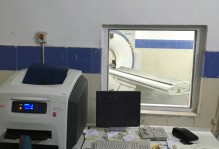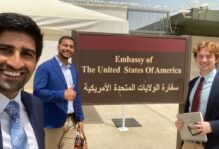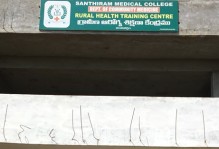U.S. State Department, Reves Center, and GRI Bring the World to W&M and W&M to the World
By Katie Spofford ’22
In spring 2020, William & Mary students again participated in Diplomacy Lab, “a public-private partnership that enables the State Department to ‘course-source’ research related to foreign policy challenges by harnessing the efforts of students and faculty experts at colleges and universities across the United States” (State Department). Under the direction of the Reves Center for International Studies and the Global Research Institute, four student teams won their bids to participate in the program.
The first of these was a continuation of the work done by GRI’s Blockchain Lab, which tracked online spending through a chronologically-relevant digital ledger. Adjunct professor Andrew Langer led the charge on evaluating the effectiveness of blockchain in improving human rights global supply chains for the Department of State. The compiled data was added to the Blackchain4Good database and used to assess how supply chains may not be meeting human rights standards. Professor Langer’s team paid special attention to those companies with extractive tendencies or a large number of suppliers. Finally, the lab provided a metric for measuring violations of ethical standards and possible solutions.
GRI Assistant Director David Trichler also explored risks to human rights in his course entitled 5G and Democratic Governance. In this small group setting, students used policy papers, recommendation analysis, and op-eds to dissect the security risk posed by 5G internet. As this conversation was held in a classroom setting (albeit through the magic of Zoom) rather than a typical lab, students were granted access to expertise to policy professionals from within and without the State Department. Drawing from those professionals and their own research, the semester ended with a drafted speech highlighting ways in which the U.S. can prepare the next wave of online threats. The class received praise from DoS representatives, one saying the work was “well thought out and largely in line with the type of creative brainstorming we are looking for.”
The third Diplomacy Lab project was led by Rob Rose, Executive Director of W&M’s Institute for Integrative Conservation. His lab examined effective tools to mitigate wildlife conflict, particularly in the KAZA transfrontier conservation area in southern Africa. The Geospatial Information System team began mapping the region and then went on to predict the likelihood of future human-wildlife conflict. As explained by student Laren Kohout ’21, “This lab allowed me to expand my research, collaboration, and GIS skills while learning about a topic of conservation that hadn’t been previously covered in any of my classes at William & Mary. These projects provide a unique and engaging community as there is a large variety of issues being researched.” Another student, Maddy Mulder ’21, stressed the importance of connection-building across her time with the lab. She explained, “One unexpected, but welcomed lesson this lab taught me is the value of networking; during this project, the value of networking was on full display every time we were able to connect with practitioners in the field (even in the midst of a global pandemic) and I was able to learn and practice how to network myself while our team was trying to find the data we needed.” The GIS team’s State Department counterpart commended their work, stating, “Their research identified the importance of community involvement in successful conflict mitigation efforts, which has reinforced our interest in supporting government decentralization efforts that contribute to community development and environmental conservation.”
The final W&M Diplomacy Lab team investigated the holistic integration of care for elderly homeless people through innovative housing options. Led by AidData’s Senior Research Analyst Mihir Prakash, the project sought to draw comparisons between homelessness in South Africa and that in dissimilar nations. The broad scope of implications for the team’s research was not lost on Diplomacy Lab representatives. Those at the State Department commented, “It is seldom that one finds such easy traction between researchers across the globe, as I found in working with Mihir Prakash and his team. The thoroughness, quality and professionalism with which they executed our research brief, within tight time frames, speak not only of scholarly excellence, but also of passion for the topic at hand. [W&M], through this team, will contribute to end homelessness for older persons in South Africa, one person at a time.” While the proposed solutions from the team were tailored to fit South Africa, the socio-economic impacts could be applied around the world, shaping the way governments address the problem of homelessness.
In sum, these students can go confidently forward with the knowledge that they consulted on pressing global issues. They gained professional experience, broadened their perspectives, and contributed to real solutions. Policymakers leveraged smart, passionate students guided by thoughtful professors, and succeeded in bringing the world to W&M and W&M to the world.




No comments.
Comments are currently closed. Comments are closed on all posts older than one year, and for those in our archive.